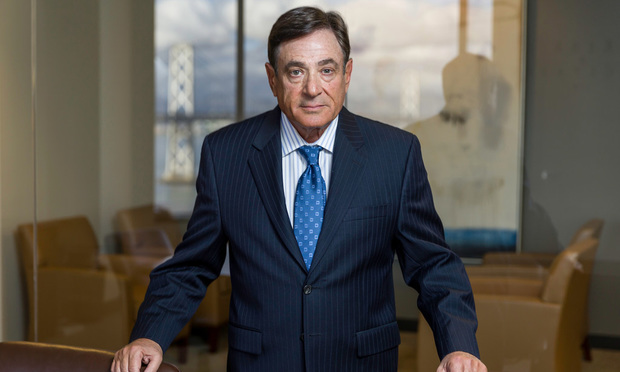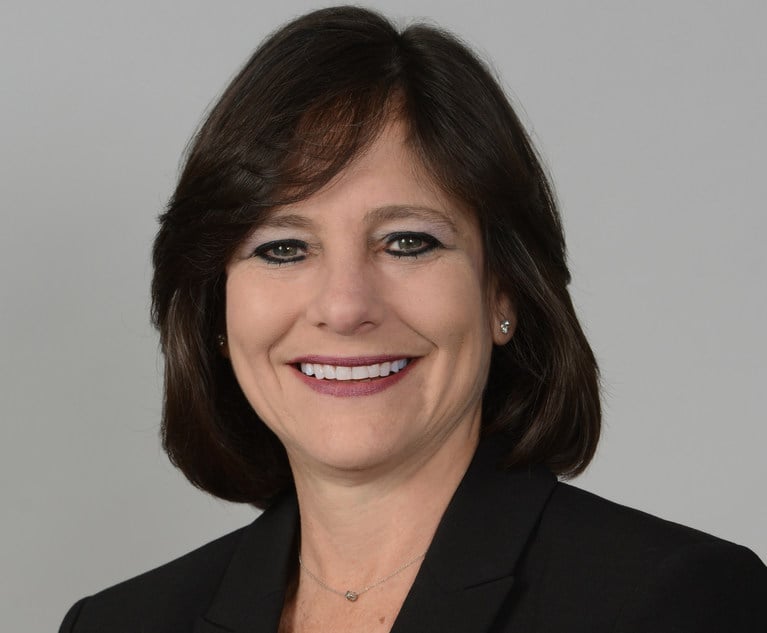9th Circuit Upholds Much of Former Bio-Rad GC's $11M Whistleblower Verdict
In a mixed ruling, the Ninth Circuit found a problem with the jury instructions in former Bio-Rad general counsel Sanford Wadler's whistleblower trial. The court, however, upheld Wadler's win on California public policy grounds, leaving in place $5 million in punitive damages and $2.96 million in compensatory damages.
February 26, 2019 at 04:43 PM
4 minute read
The original version of this story was published on The Recorder
 Sanford Wadler. Photo: Jason Doiy/ALM
Sanford Wadler. Photo: Jason Doiy/ALM
Despite finding flaws in the jury instructions, the Ninth Circuit on Tuesday left in place a significant chunk of a jury verdict that former Bio-Rad Laboratories Inc. general counsel Sanford “Sandy” Wadler won against the company in a 2017 whistleblower trial.
Wadler was awarded $11 million in damages after a San Francisco federal jury found in February 2017 that the company had fired him in retaliation for raising concerns internally about potential violations of the Foreign Corrupt Practices Act within Bio-Rad's China operations.
In a 23-page published decision, a three-judge Ninth Circuit panel issued a mixed ruling that left standing the jury's award of $5 million in punitive damages and $2.96 million in compensatory damages. The panel, however, found that U.S. Magistrate Judge Joseph Spero, who oversaw the trial, erred in a section of the jury instructions that listed the Foreign Corrupt Practices Act's anti-bribery and books-and-records provisions as “rules or regulations of the SEC,” falling under Section 806 of the Sarbanes-Oxley Act. The FCPA, the court clarified, is a statute.
“Although the words 'rule' and 'regulation' could perhaps encompass a statute when read in isolation, the more natural and plain reading of these words together and in context is that they refer only to administrative rules or regulations,” wrote Circuit Judge Mark Bennett. “That the phrase 'rule or regulation' is used in conjunction with an administrative agency, the SEC, suggests that it encompasses only administrative rules or regulations,” he wrote.
The Ninth Circuit vacated Wadler's win on his claim under Sarabanes-Oxley, but found that the juror instruction error was “harmless” with respect to his parallel California public policy claim—a so-called 'Tameny' claim named after the seminal 1980 California Supreme Court wrongful termination decision Tameny v. Atlantic Richfield.
“We have repeatedly held that an instructional error is harmless when the jury necessarily would have reached the same verdict under a proper instruction,” Bennett wrote. “In these circumstances, the SOX instructional error was harmless as to the Tameny verdict because Wadler's Tameny claim—that Bio-Rad retaliated against him for reporting conduct that he reasonably believed violated the FCPA—did not depend on SOX.”
In an unpublished memorandum decision also issued Tuesday, the panel reversed Wadler's win on his whistleblower claim under the Dodd-Frank Act. The court cited Digital Realty Trust Inc. v. Somers, a Supreme Court decision handed down after the Wadler verdict, which held the Dodd-Frank whistleblower provisions don't apply to internal reports like Wadler's. That decision will trim $2.96 million awarded under Dodd-Frank's doubling provision from the $11 million verdict.
The Ninth Circuit remanded the case to Spero to consider whether to hold a new trial on Wadler's Sarbanes-Oxley claims.
Wadler's lead appellate lawyer, Michael von Loewenfeldt of WVBR, called the Ninth Circuit decision “a big vindication.”
“We're happy that the court affirmed the Tameny claim and upheld the jury's verdict that Bio-Rad retaliated against our client,” von Loewenfeldt said. He said he was still reviewing issues relating to any potential new trial.
Bio-Rad's lead appellate lawyer, Kathleen Sullivan of Quinn Emanuel Urquhart & Sullivan said that the company was “pleased that the Ninth Circuit set aside the judgment on two of the three claims against it and directed the lower court to reduce damages by nearly $3 million.” The company, she said, is evaluating its “further appellate options as to the sole remaining claim.”
Michael Koehler, a professor at Southern Illinois University School of Law and the author of the FCPA Professor blog, said the ruling is narrow, given the wording of Section 806 of Sarbanes-Oxley, but important nonetheless.
“Words matter and the court found that Congress' use of the phrase 'rule or regulation of the SEC' in Section 806 of SOX was intentional, and thus should not be interpreted to include the FCPA which is, after all, a law—not a 'rule or regulation of the SEC,” Koehler said. “More broadly though, the statutory construction analysis of the appellate court is interesting because the FCPA contains a number of words that Congress intended to mean something and conversely does not contain certain words that Congress intended to omit from the FCPA. This statutory construction analysis is relevant to so many FCPA issues.”
Related stories:
5 Takeaways From Bio-Rad's Trial Loss, and Its Ousted GC's Win
This content has been archived. It is available through our partners, LexisNexis® and Bloomberg Law.
To view this content, please continue to their sites.
Not a Lexis Subscriber?
Subscribe Now
Not a Bloomberg Law Subscriber?
Subscribe Now
NOT FOR REPRINT
© 2025 ALM Global, LLC, All Rights Reserved. Request academic re-use from www.copyright.com. All other uses, submit a request to [email protected]. For more information visit Asset & Logo Licensing.
You Might Like
View All
Big Company Insiders See Technology-Related Disputes Teed Up for 2025

Litigation Leaders: Jason Leckerman of Ballard Spahr on Growing the Department by a Third Via Merger with Lane Powell

Litigation Leaders: Greenspoon Marder’s Beth-Ann Krimsky on What Makes Her Team ‘Prepared, Compassionate and Wicked Smart’
Trending Stories
- 1'It's Not Going to Be Pretty': PayPal, Capital One Face Novel Class Actions Over 'Poaching' Commissions Owed Influencers
- 211th Circuit Rejects Trump's Emergency Request as DOJ Prepares to Release Special Counsel's Final Report
- 3Supreme Court Takes Up Challenge to ACA Task Force
- 4'Tragedy of Unspeakable Proportions:' Could Edison, DWP, Face Lawsuits Over LA Wildfires?
- 5Meta Pulls Plug on DEI Programs
Who Got The Work
Michael G. Bongiorno, Andrew Scott Dulberg and Elizabeth E. Driscoll from Wilmer Cutler Pickering Hale and Dorr have stepped in to represent Symbotic Inc., an A.I.-enabled technology platform that focuses on increasing supply chain efficiency, and other defendants in a pending shareholder derivative lawsuit. The case, filed Oct. 2 in Massachusetts District Court by the Brown Law Firm on behalf of Stephen Austen, accuses certain officers and directors of misleading investors in regard to Symbotic's potential for margin growth by failing to disclose that the company was not equipped to timely deploy its systems or manage expenses through project delays. The case, assigned to U.S. District Judge Nathaniel M. Gorton, is 1:24-cv-12522, Austen v. Cohen et al.
Who Got The Work
Edmund Polubinski and Marie Killmond of Davis Polk & Wardwell have entered appearances for data platform software development company MongoDB and other defendants in a pending shareholder derivative lawsuit. The action, filed Oct. 7 in New York Southern District Court by the Brown Law Firm, accuses the company's directors and/or officers of falsely expressing confidence in the company’s restructuring of its sales incentive plan and downplaying the severity of decreases in its upfront commitments. The case is 1:24-cv-07594, Roy v. Ittycheria et al.
Who Got The Work
Amy O. Bruchs and Kurt F. Ellison of Michael Best & Friedrich have entered appearances for Epic Systems Corp. in a pending employment discrimination lawsuit. The suit was filed Sept. 7 in Wisconsin Western District Court by Levine Eisberner LLC and Siri & Glimstad on behalf of a project manager who claims that he was wrongfully terminated after applying for a religious exemption to the defendant's COVID-19 vaccine mandate. The case, assigned to U.S. Magistrate Judge Anita Marie Boor, is 3:24-cv-00630, Secker, Nathan v. Epic Systems Corporation.
Who Got The Work
David X. Sullivan, Thomas J. Finn and Gregory A. Hall from McCarter & English have entered appearances for Sunrun Installation Services in a pending civil rights lawsuit. The complaint was filed Sept. 4 in Connecticut District Court by attorney Robert M. Berke on behalf of former employee George Edward Steins, who was arrested and charged with employing an unregistered home improvement salesperson. The complaint alleges that had Sunrun informed the Connecticut Department of Consumer Protection that the plaintiff's employment had ended in 2017 and that he no longer held Sunrun's home improvement contractor license, he would not have been hit with charges, which were dismissed in May 2024. The case, assigned to U.S. District Judge Jeffrey A. Meyer, is 3:24-cv-01423, Steins v. Sunrun, Inc. et al.
Who Got The Work
Greenberg Traurig shareholder Joshua L. Raskin has entered an appearance for boohoo.com UK Ltd. in a pending patent infringement lawsuit. The suit, filed Sept. 3 in Texas Eastern District Court by Rozier Hardt McDonough on behalf of Alto Dynamics, asserts five patents related to an online shopping platform. The case, assigned to U.S. District Judge Rodney Gilstrap, is 2:24-cv-00719, Alto Dynamics, LLC v. boohoo.com UK Limited.
Featured Firms
Law Offices of Gary Martin Hays & Associates, P.C.
(470) 294-1674
Law Offices of Mark E. Salomone
(857) 444-6468
Smith & Hassler
(713) 739-1250







